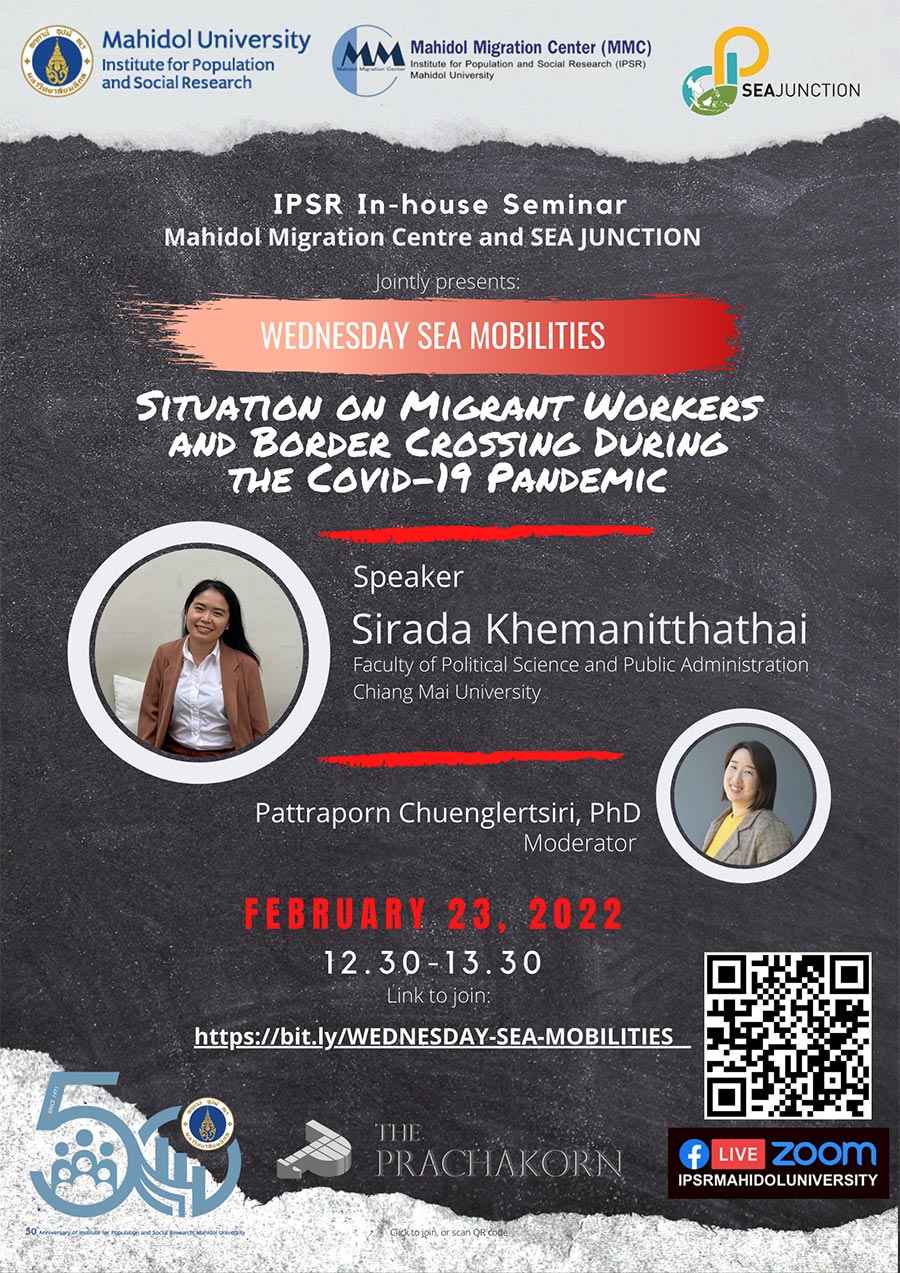
- This event has passed.
Public Talk on Migrant Workers and Border Crossing During the Covid-19 Pandemic in Thailand by Sirada Khemanitthathai
23 February, 2022 @ 12:30 pm - 1:30 pm
SEA Junction in collaboration with IPSR In-House Seminar and Mahidol Migration Centre (MMC) has launched a series of bi-monthly events entitled ‘Wednesday SEA Mobilities’, starting in February 2022. The last Wednesday of every two months we will jointly hold seminars or panels discussing vast arrays of current Southeast Asia’s mobility issues by experts, academics, practitioners, NGO workers, migrants, and people from the fields.
Our first Wednesday SEA Mobility’s event on 23 February 2022 at 12.30-1.30pm will be a presentation by Sirada Khemanitthathai, of the recently published report in Thai entitled “Situation on Migrant Workers and Border Crossing During the Covid-19 Pandemic”. The event online will be broadcast on Zoom at https://bit.ly/WEDNESDAY-SEA-MOBILITIES and also on the FB pages of IPSR and of SEA Junction.
Sirada Khemanitthathai is the author of the report in collaboration with Migrant Working Group and with the support of Humanity United. She is with the Faculty of Political Science and Public Administration, Chiang Mai University. She completed her PhD from the department of Politics and International Studies, SOAS, University of London. Her research focus is on cross-border migration between Thailand and Myanmar, transnational politics, state policies, and human rights. She also had experiences working in a non-governmental organization on human rights and was a founder of a Burmese language school.
The link to the report in Thai can be found here and below is a brief abstract.
Abstract
Migrant workers’ housing and work conditions were major factors in the forming of COVID-19 clusters in Thailand. At the same time, the spread of COVID-19 in Thailand exacerbated the vulnerability of migrant workers economically and socially. Migrant workers were often stigmatized, stereotyped and utilized to reproduce discourses of otherness. They were also subjected to double standards and more severe containment measures when compared to Thai citizens in the same locations. At the same time, although state policies and measures ensure that non-Thai nationals have access to public health services, the worsening outbreak across the country depleted public health resources and that led to exclusion based on nationality.
In the management of migration, the Thai government used existing ad hoc mechanisms. Due to high labor demands among private sectors, the government also considers restarting the labor import schemes through bilateral MoUs.
Regarding the border crossing, there have been several forms include crossing the border to find jobs in Thailand, using Thailand as a transit, returning to their home countries, Thai people smuggling back to Thailand, and Thai people smuggling to work in neighboring countries.

Please contact us at southeastasiajunction@gmail.com or phone: +66970024140 for information.
Organizers
SEA Junction
SEA Junction, established under the Thai non-profit organization Foundation for Southeast Asia Studies (ForSEA), aims to foster understanding and appreciation of Southeast Asia in all its socio-cultural dimensions, from arts and lifestyles to economy and development. Conveniently located at Room 408 of the Bangkok Arts and Culture Center or BACC (across MBK, BTS National Stadium), SEA Junction facilitates public access to knowledge resources and exchanges among students, practitioners and Southeast Asia lovers. For more information, see www.seajunction.org, join the Facebook group: http://www.facebook.com/groups/1693058870976440/ and follow us on Twitter and Instagram @seajunction
Institute for Population and Social Research (IPSR), Mahidol University
IPSR was established in 1971 and has become one of Asia’s premier population research and training hubs. The Institute conducts research and provides training in population, sexual and reproductive health and development with a focus on Thailand and on neighbouring countries in Southeast Asia, with the ultimate goal of improving the quality of life for all. For more information, see https://ipsr.mahidol.ac.th.



